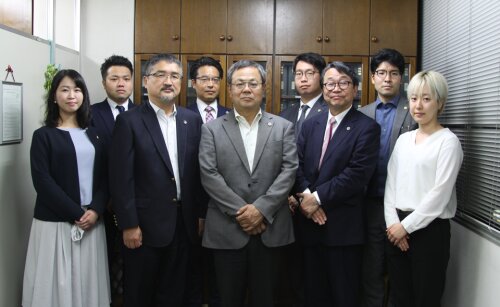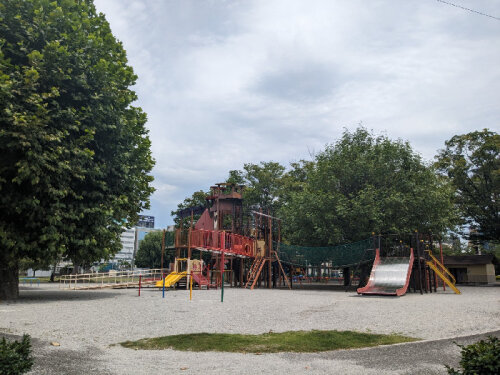Best Divorce & Separation Lawyers in Shizuoka
Share your needs with us, get contacted by law firms.
Free. Takes 2 min.
Free Guide to Hiring a Family Lawyer
List of the best lawyers in Shizuoka, Japan
About Divorce & Separation Law in Shizuoka, Japan
Divorce and separation in Shizuoka are governed by Japanese national law and administered locally through municipal offices and the family court system. There are three main legal routes to end a marriage - divorce by mutual agreement, divorce by mediation in family court, and divorce by court judgment. Procedures that affect children, property, and financial support are handled according to the Civil Code, Family Registration Law, and related statutes. Local institutions in Shizuoka - such as city and ward offices, the family court, child welfare agencies, and local bar association services - provide the administrative and judicial channels you will use to register or contest a divorce and to resolve related disputes.
Why You May Need a Lawyer
A lawyer can help protect your rights, explain legal options, and navigate administrative and court procedures. Common situations where legal help is advisable include:
- Complex asset division or disputes about what is marital property versus separate property.
- Disagreements about child custody, parental authority, visitation, or child support.
- Spousal support claims where income, earning potential, or future needs must be assessed.
- Cases involving domestic violence, harassment, or immediate safety concerns.
- International elements, such as one spouse living abroad, a foreign-national spouse, or potential child abduction issues.
- When one party refuses to sign a mutual divorce agreement and mediation or litigation is needed.
- If you need enforcement of agreed terms - for example, non-payment of child support or refusal to transfer property.
Local Laws Overview
Key legal aspects to keep in mind in Shizuoka are aligned with national Japanese law, but local offices and courts carry out procedures:
- Types of divorce: Mutual agreement divorce (協議離婚, kyogi rikon) is completed by filing a divorce notification at the municipal office where the family register is kept. If spouses cannot agree, family court mediation (調停, chotei) or a court judgment (判決, hanketsu) is required.
- Family register (戸籍, koseki): A divorce is recorded in the family register. The municipal government office where your koseki is registered handles the official entry after you submit the required paperwork.
- Child custody and parental authority: Japanese courts generally grant sole custody to one parent after divorce. Joint custody after divorce is not recognized in the same way as it is in some other countries. Courts focus on the child’s best interests when deciding custody, visitation, and parental authority.
- Child support: Courts use guideline tables to determine appropriate child support amounts based on parents’ incomes and the child’s needs. Enforcement mechanisms exist if support is not paid.
- Division of marital property (清算, seisan): Marital assets acquired during the marriage are subject to division. Property owned prior to marriage, inheritances, and gifts specifically to one spouse are typically treated as separate property unless commingled.
- Spousal support: Alimony may be awarded depending on circumstances such as income disparity, length of marriage, and contribution to the household or career sacrifices made by a spouse.
- Protection from domestic violence: Victims can seek protection orders under the Act on the Prevention of Spousal Violence and the Protection of Victims. Police and family courts can issue emergency or civil protection measures.
- International cases: Japan is a party to international instruments such as the Hague Convention on the Civil Aspects of International Child Abduction. Cross-border custody disputes may involve international law and cooperation with foreign authorities.
Frequently Asked Questions
How can I legally get a divorce in Shizuoka?
You can file for divorce by mutual agreement at your municipal office by submitting a completed divorce notification and required identification documents. If you cannot agree, you can apply for family court mediation. If mediation fails, you may file a lawsuit in court for a divorce judgment. Each route has different steps, timelines, and potential outcomes.
What documents should I bring when filing a mutual consent divorce?
Bring your family register (koseki tohon) or information needed to prepare the divorce notification, personal identification, seals or signatures, and any written agreement you and your spouse have about custody, support, and property division. If children or property are involved, bring relevant documents such as child birth records, financial statements, property registrations, and bank account information.
Who gets custody of the children after divorce?
Japanese courts typically award sole parental authority to one parent. Courts decide based on the child’s welfare, established caregiving arrangements, parental capacity, and stability of living conditions. Parents often aim to reach a custody agreement through negotiation or mediation to avoid uncertain court outcomes.
How is child support calculated?
Courts and mediators refer to guideline tables that consider both parents’ incomes, the number of children, and the child’s needs. The guideline gives a monthly support amount but can be adjusted for special circumstances. Child support continues until the child reaches the age or stage defined in the agreement or court order, commonly until adulthood or completion of education.
Am I entitled to spousal support?
Spousal support may be awarded when one spouse needs financial assistance after divorce and the other spouse is able to pay. Factors include length of marriage, each spouse’s income and earning capacity, contributions to the household, and the need for retraining or time to find employment. Spousal support can be settled by mutual agreement or by court order.
How are marital assets divided?
Marital assets acquired during the marriage are generally split equitably between spouses. Separate property, such as pre-marriage assets, gifts, or inheritances kept distinct, is usually excluded. Determining what qualifies as marital property can be complex and may require documentation, valuations, and legal advice.
What should I do if I am a victim of domestic violence?
If you are in immediate danger, contact the police. You can seek emergency help from local shelters and municipal support services. A lawyer can assist in obtaining protection orders from the family court and in handling related divorce, custody, or criminal matters. Keep records of incidents, medical reports, messages, and any other evidence to support your case.
Can a foreign spouse be deported or affect divorce proceedings?
Immigration status is a separate issue from divorce, but divorce can affect residence rights for foreign nationals who hold status based on marriage. Consult an immigration specialist in addition to a family lawyer to understand visa implications. International child custody matters may invoke international agreements and require coordination with authorities abroad.
How long does a contested divorce take in family court?
Timelines vary widely. Mediation in family court can take several months depending on the complexity and scheduling. If mediation fails and the case goes to trial, it may take a year or more before final resolution. Delays often depend on evidence collection, expert assessments, and court caseloads.
Can I enforce an agreement if my ex-spouse does not pay child support or follow terms?
Yes. Court-ordered support can be enforced through collection procedures, wage garnishment, or other enforcement measures. Even private agreements can be made into enforceable orders by having them approved by the family court or through a civil judgment. A lawyer can help you pursue enforcement steps and advise on available options.
Additional Resources
These local and national bodies can help you find legal information, assistance, or support in Shizuoka:
- Shizuoka Family Court and family court branches - handle mediation, custody, and protection order procedures.
- Municipal city and ward offices in Shizuoka Prefecture - process divorce registrations and issue family register copies.
- Shizuoka Bar Association - for lawyer referrals and information about local attorneys experienced in family law.
- Japan Legal Support Center (Houterasu) - provides consultation services and information about legal aid and fee-assistance programs.
- Ministry of Justice - administers laws related to civil matters, family registration, and international legal cooperation.
- Child Guidance Centers (Kodomo Sodanjo) in Shizuoka - child welfare and guidance services when children’s safety or welfare is a concern.
- Domestic violence support centers and municipal gender equality centers - emergency assistance, counseling, and shelter information for victims.
- Local social welfare offices - for information on financial support, public benefits, and social services that may be available after separation.
Next Steps
If you are considering separation or divorce in Shizuoka, follow these practical steps:
- Collect and organize documents: marriage certificate, family register details, identification, income statements, tax returns, bank statements, property records, and documents related to children.
- Seek an initial legal consultation: contact the Shizuoka Bar Association or Japan Legal Support Center for referrals and to learn about legal aid eligibility.
- Consider mediation first: mutual agreements or family court mediation can be quicker, less costly, and less adversarial than full litigation.
- Address urgent safety needs: if you face domestic violence or threats, contact police, shelters, and legal services immediately and apply for protection orders if necessary.
- Plan financially and practically: understand how separation will affect housing, living expenses, health insurance, and child care arrangements. Explore local welfare resources if needed.
- If there are international elements, consult both a family lawyer and an immigration lawyer early to protect custody and residence rights.
- Preserve evidence: keep records of communications, financial transactions, and any incidents that affect your case.
- Get help enforcing agreements: if an agreed or court-ordered term is not being followed, consult a lawyer promptly to pursue enforcement mechanisms.
Facing separation is stressful; informed legal advice and early action improve outcomes. Use local resources and professional counsel in Shizuoka to understand your rights and options and to plan practical next steps that protect you and your children.
Lawzana helps you find the best lawyers and law firms in Shizuoka through a curated and pre-screened list of qualified legal professionals. Our platform offers rankings and detailed profiles of attorneys and law firms, allowing you to compare based on practice areas, including Divorce & Separation, experience, and client feedback.
Each profile includes a description of the firm's areas of practice, client reviews, team members and partners, year of establishment, spoken languages, office locations, contact information, social media presence, and any published articles or resources. Most firms on our platform speak English and are experienced in both local and international legal matters.
Get a quote from top-rated law firms in Shizuoka, Japan — quickly, securely, and without unnecessary hassle.
Disclaimer:
The information provided on this page is for general informational purposes only and does not constitute legal advice. While we strive to ensure the accuracy and relevance of the content, legal information may change over time, and interpretations of the law can vary. You should always consult with a qualified legal professional for advice specific to your situation.
We disclaim all liability for actions taken or not taken based on the content of this page. If you believe any information is incorrect or outdated, please contact us, and we will review and update it where appropriate.









